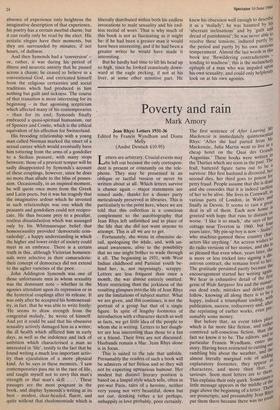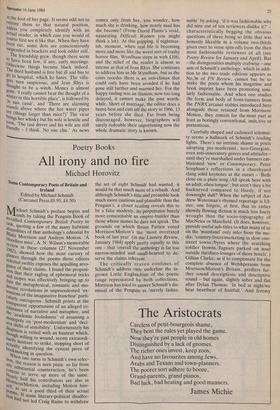Poverty and rain
Mark Amory
Jean Rhys: Letters 1931-36 Edited by Francis Wyndham and Diana . Melly (Andre Deutsch £10.95)
Tetters are arbitrary. Crucial events may Abe left out because the only correspon- dent is present or constantly on the tele- phone. They may be presented in an oblique or tactful version or never be written about at all. Which letters survive is chance again - major statements are tossed aside, thanks for a dinner party meticulously preserved in libraries. This is particularly to the point here, where we are told that this collection is a conscious complement to the autobiography that Jean Rhys left unfinished and in place of the life that she did not want anyone to attempt. This is all we are to get.
Fortunately, she wrote in obsessive de- tail, apologising the while, and, with un- usual awareness, alive to the possibility that no one might bother to wade through it all. The beginning in 1931, with West Indian childhood and Parisian youth be- hind her, is, not surprisingly, scrappy. Letters are less frequent than once a month, the war almost entirely omitted. More restricting than the jerkiness of the resulting glimpses into the life of Jean Rhys are the limitations of subject matter. What we are given, and this continues, is not the portrait of a group but that of a single figure. In spite of lengthy footnotes of introduction with a character sketch as well as facts, we get little idea of the people to whom she is writing. Letters to her daugh- ter are less interesting than those to a fan or a friend. Their lives are not discussed. Husbands remain a blur. Jean Rhys alone is in focus.
This is suited to the tale that unfolds. Presumably the readers of such a book will be admirers of her fiction and so they will not be expecting uproarious humour. Her modest but distinct literary position is based on a limpid style which tells, often in pre-war Paris, tales of a heroine, neither very young nor very beautiful, down but not out, drinking rather a lot perhaps, unhappily in love probably, poor certainly.
The first sentence of After Leaving Mr Mackenzie is immediately quintessential Rhys: 'After she had parted from Mr Mackenzie, Julia Martin went to live in a cheap hotel on the Quai des Grands Augustins.' These books were written in the Thirties which are soon in the past. The frail, battered figure turns out to be a survivor. Her first husband is divorced, her second dies, her third goes to prison frn, petty fraud. People assume that she is dead and she concedes that it is indeed tactless of her to be alive. She lives in Cornwall, in various parts of London,- in Wales and finally in Devon. It seems to rain a great deal in all of them. Each new home is greeted with hope that runs to distaste or worse. 'I like it so much,' she says of her cottage near Tiverton in 1960, but four years later, 'My pin-up boy is now - Staiin who machine-gunned these country env. acters like anything.' An actress wishes T do radio versions of her stories, and she ,_15 so pleased that even when, years later, sne is more or less tricked into signing a di!. astrous contract, she remains loyal to he' The gratitude persisted partly because r.he encouragement started her writing agara: We hear in exhaustive detail of the first germ of Wide Sargasso Sea and the numer- ous dead ends, mistakes and delays raa follow, knowing all along there is to be. happy, indeed a triumphant ending, vat publication, success, rediscovery and, afte. the reprinting of earlier works, even Pre sumably some money. But before that, an event takes place which is far more like fiction, and rather contrived self-conscious fiction, than the fact we know it to be. The editors, and the particular Francis Wyndham, enter tht story. Having been restricted to cutting one rambling bits about the weather, and r./1 almost literally marginal role of addlas explanatory footnotes, they appear 3s characters, and more than that. a saviours. Soon most letters are to then': This explains their only quirk. Sometimes; little message appears in the middle of the page above the beginning of a letter. Th,e_ss are postscripts, and presumably Jean RnYto put them there because there was no 100 at the foot of her page. It seems odd not to restore them to that natural position, Unless you completely identify with an actual reader, in which case you would of course first see it like that. When they have been cut, some dots are conscientiously suspended in brackets and look odder still.
The friendship grew, though there seem to have been few, if any, early meetings. Otherwise things became black indeed. The third husband is free but ill and has to go to hospital, which he hates. The villa- gers turn suspicious, and Jean Rhys is thought to be a witch. Money is almost gone. 'I really cannot bear the thought of a
.
nter in this horrible place', is followed by le suis casse, and 'There are alarming sounds above where the hot water pipes r e. (things larger than mice?)' The vicar 'rings her whisky but his wife is hostile and soon, 'The taxi driver and his wife are still friendly — I think. No one else.' As news comes only from her, you wonder, how much she is drinking, how nearly mad has she become? (From David Plante's vivid, nauseating Difficult Women you might think a lot). At this gripping, if nightmar- ish, moment, when real life is becoming more and more like the worst sort of trashy horror film, Wyndham steps in with £100, and the relief of the reader is almost as intense as that of Jean Rhys. She continues to address him as Mr Wyndham, but as the crisis recedes there is an anti-climax that could only have been avoided if he had gone still further and married her. For the happy ending was an illusion; now too long delayed, it cannot make the past worth- while. Short of marriage, the editor does a brave best and cuts off the story in 1966, 13 years before she died. Far from being discouraged, however, biographers will surely redouble their importuning now the whole dramatic story is known.













































 Previous page
Previous page